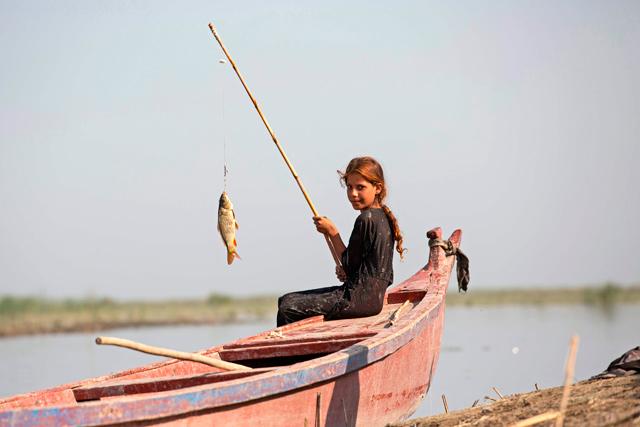You are here
New US threats to Iraq widen rifts
By AFP - Sep 27,2020 - Last updated at Sep 27,2020

A girl catches a fish in the marshes of the southern district of Chibayish in Dhi Qar province, about 120 kilometres northwest of the southern city of Basra, on September 23 (AFP photo)
BAGHDAD — Enraged by near-daily attacks on its interests in Iraq, Washington has threatened to close its embassy in Baghdad, in a blow to a premier seen as a bulwark against Iran.
Iraq has long been caught in a tug-of-war between its allies Iran and the US, rendered rockier by Washington's "maximum pressure" policy against Tehran since 2018.
In a new escalation, US Secretary of State Mike Pompeo called Iraqi President Barham Saleh last week to deliver an ultimatum, Iraqi and foreign officials told AFP.
Unless Iraq's government puts an end to the rockets raining down on US military and diplomatic sites, Washington would shutter its embassy and recall its troops, the sources said.
“The Americans aren’t just angry. They’re really, really, really angry,” one Iraqi official told AFP.
Another said: “The honeymoon is over.”
The US still has hundreds of diplomats in its mission at the high-security Green Zone in Baghdad and around 3,000 troops based in three bases across the country.
Since 2019, dozens of rockets and improvised explosives have targeted these sites, with US and Iraqi officials blaming Tehran-backed factions including Kataeb Hizbollah.
Washington has twice retaliated with strikes on Kataeb Hizbollah in Iraq and threatened earlier this year to bomb more than 120 further sites if the rocket attacks cost American lives, a top Iraqi official told AFP.
The frustration failed to ease even after Mustafa Al Kadhemi, seen as Western-leaning, took office as premier in May.
Ahead of Kadhemi’s visit to Washington in August, the US signalled it was “unsatisfied with his actions” against pro-Iran armed groups, an Iraqi official said.
The US declined to comment on Pompeo’s latest call, but a State Department official told AFP that “Iran-backed groups launching rockets at our embassy are a danger not only to us, but to the Government of Iraq”.
Growing rift
Fresh in the minds of Iraqi officials and armed groups is the US drone strike in January that killed top Iranian general Qasem Soleimani and Abu Mahdi Al Muhandis, the deputy head of Iraq’s state-sponsored Hashed Al Shaabi.
Since then, many pro-Iran paramilitary leaders have gone into hiding lest they be subject to American strikes or sanctions.
The new US threats seem to have deepened the growing rift between factions loyal to Iran and those less willing to enter into a full confrontation with the US.
After months of silence, influential cleric and political leader Moqtada Sadr took to Twitter this week to call for “the creation of a security, military and parliamentary committee to investigate” the rocket attacks.
Within minutes, Kadhemi and other top government figures endorsed the recommendation.
“There’s a consensus on condemning these attacks. Kataeb Hizbollah and other hardliners are isolated and left without political cover,” an Iraqi official said.
Even the Hashed Al Shaabi slammed rocket attacks as “illegal military acts”, denied involvement and formally sidelined a pair of commanders seen as too Tehran-leaning.
But the hardliners, too, are organising.
A half-dozen previously unheard-of groups have claimed responsibility for rocket attacks on the US and even threatened the United Nations in recent months.
Iraqi intelligence officials and political sources say Iran has been gathering the most hardline among its Iraqi allies into these new formations.
PM in hot water?
These reconstituted groups see Kadhemi as Washington’s man in Baghdad and are irked by his vows to rein them in.
“They’re sending a message from Iran to the US: the recent political developments have changed nothing. We can still hit you hard, and no leader can implement your agenda in Iraq,” said a source from Iraq’s Shiite political network.
That has left the prime minister in a precarious position.
A US withdrawal could hand his rivals an unintended propaganda win, a Western diplomat in Baghdad told AFP.
“If Washington follows through and withdraws its people, these groups will be able to brag that they kicked the Americans out of Iraq at little cost,” the official said.
Iraq’s parliament voted after Soleimani’s killing to oust foreign troops posted in the country to help fight extremist remnants, but Kadhemi has tried to slow-walk the decision.
He has also embarked on an anti-corruption drive, launched a strategic dialogue with Washington and sought to fast-track deals with US companies that would decrease Iraq’s reliance on Iranian energy imports.
His downfall, Western diplomats and analysts said, could be a nightmare for Iraq’s stability.
“If the US really closes its embassy, it will leave Kadhemi in a very weak and dangerous position, opening the door for militias to expand and maybe take extreme action against the state,” said Ali Mamouri, an analyst and editor of the Iraq Pulse at Al Monitor news website.
By Ammar Karim
Related Articles
BAGHDAD — Iraqi security forces were Friday interrogating pro-Iran fighters detained for planning a rocket attack in the first such raid in
BAGHDAD — Eyeing Washington's withdrawal of 500 more troops from Iraq, pro-Iran factions have boldly resumed attacks on the US embassy there
BAGHDAD — Two rocket attacks targeted American diplomatic and military installations overnight, Iraq's security forces said Sunday, a little
















